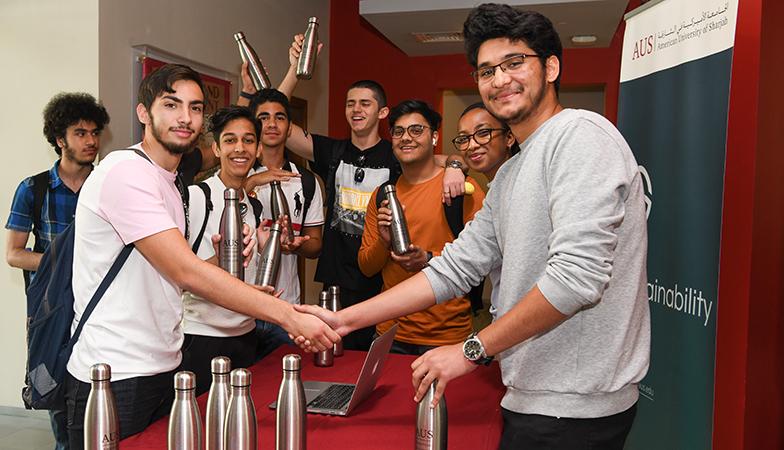- About
- Admissions
- Study at AUS
- Prospective Students
- Bachelor's Degrees
- Master's Degrees
- Doctoral Degrees
- Admission Publications
- International Students
- Contact Admissions
- Grants and Scholarships
- Sponsorship Liaison Services
- Testing Center
- New Student Guide
- File Completion
- New Student Orientation
- Payment Guide
- Executive Education
- Students with Disabilities
- Academics
- Life at AUS
- Research
- Contact Us
- Apply Now
- .

AUS leads fight on plastic
Starting in January 2020, all vendors on the AUS campus will be banned from selling plastic water containers holding less than 500 millimeters of water. Juice and soda drinks will be required to be sold in aluminum containers. In addition, single-use plastic bags and eating utensils—such as take-away containers, straws, plates, cups and cutlery—will also be prohibited; they will be replaced with environmentally friendly plant-based and biodegradable alternatives.
The initiative, led by AUS’ Sustainability Office, aims to eliminate the need for single-use plastic and Styrofoam, while providing the AUS community with access to free, high-quality drinking water, in line with the principles set out by the United Nations in its Sustainable Development Goals. Working with the AUS Student Council, the AUS Sustainability Office will also provide free long-life coffee mugs.
To facilitate the transition, the university is distributing free double-wall insulated, stainless steel drinking bottles to all AUS staff, students and faculty. The bottles can be filled, at no cost, at the university’s many water stations. In the AUS Library, new technology is being utilized to collect and dispense atmospheric water; Atmospheric Water Generators draw humidity from the air, turning it into pure drinking water, free of chemicals, bacteria and heavy metals.
The commitment to becoming a campus free of single-use plastic is in keeping with AUS’ broader commitment to reducing its ecological footprint, and actively encouraging those within the university’s community to lead a more sustainable lifestyle. It comes at a time when the UAE government hopes to lessen the country’s plastic waste; a law on integrated waste management was passed by the Federal National Council in 2018, which among other things, seeks to cut the total amount of waste produced. Rose Armour, Director of the AUS Sustainability Office, says eliminating single-use plastics is an important step towards reducing landfill in the UAE:
“Per capita, the UAE has some of the highest rates of waste generation in the world. A typical UAE resident uses 450 plastic water bottles on an average in a single year. With around 77 percent of all waste ending up in a landfill, there is an enormous amount of plastic entering landfill sites, impacting the environment for thousands of years to come. At the same time, we understand how important it is in an arid environment for our staff, students and faculty to consume lots of water. We have therefore developed a strategy that ensures our community stays well-hydrated, but with minimal impact on the environment. AUS is enormously proud to announce this move towards becoming single-use plastic free, and we hope other organizations throughout the region will be inspired by this move.”

